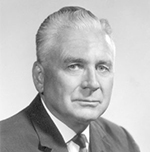The Nina C. Mackall Associate Research Professorship of Ophthalmology
 The Professorship was initiated in 1983 through the bequest of Nina C. Mackall, a friend and grateful patient of Harold G. Scheie, MD (1909–1990), and by Dr. Scheie, who was renowned for his commitment and contributions to the field of ophthalmology and to the University of Pennsylvania.
The Professorship was initiated in 1983 through the bequest of Nina C. Mackall, a friend and grateful patient of Harold G. Scheie, MD (1909–1990), and by Dr. Scheie, who was renowned for his commitment and contributions to the field of ophthalmology and to the University of Pennsylvania.
Dr. Scheie was the first resident in ophthalmology at the Hospital of the University of Pennsylvania. After serving with distinction during World War II, he returned to Penn where he remained throughout his extraordinary career. The Founder of the Scheie Eye Institute, his work brought prominence to Penn’s Department of Ophthalmology. Dr. Scheie received innumerable honors for his groundbreaking work in the treatment of cataracts and glaucoma, and was revered for his dedication to his students and patients.
Nina C. Mackall was treated by Dr. Scheie for glaucoma for over 30 years. Through the course of her treatment, she grew to admire Dr. Scheie as her trusted friend and confidant. Her bequest was made “to encourage and assist research into causes, prevention, alleviation and cure of blindness.”
 Current Chairholder
Current Chairholder
Charles Nichols, MD
Charles Nichols, MD, came to Scheie Eye Institute Perelman as a resident in 1965 after graduating from Jefferson Medical College and has remained an integral part of the Scheie and Hospital of the University of Pennsylvania (HUP) communities for over 50 years. He has provided general ophthalmic care to thousands of patients and participated in several nationally recognized initiatives.
As a senior resident, Dr. Nichols joined the medical support team for Tektite I, a nationally sponsored naval program that tested the effects of saturated diving on human health. The 1969 experiment involved sending a team of aquanauts to live in a manmade habitat 60 feet underwater for three months. Penn scientists, led by Dr. Christian J. Lambersten (then Director of Penn’s Institute of Environmental Medicine) played a major role in engineering the mission, including designing the first decompression chamber used to receive divers from pressurized compartments. Dr. Nichols was selected to join the team of Penn physicians that provided medical support to the mission. He visited the site, which was off the coast of the Virgin Islands, to perform ophthalmologic exams on the subjects.
Since joining the Scheie faculty in 1971, Dr. Nichols has become an authority on the treatment of a number of diseases, particularly those associated with compromise of the immune system. For 15 years, he ran and developed the largest center for the national Studies of the Ocular Complications of AIDS (SOCA) trials. The study investigated cytomegalovirus (CMV), a herpes virus that deteriorates the eye. The study allowed for the design of a drug that would control CMV. The disease, which used to occur in over 50% of AIDS patients, is now treatable and very rare. Dr. Nichols has also been involved in various other studies and collaborations. He spent two years in Penn’s Pharmacology Department, investigating cholinesterase in the retina, nerve transfer, and nerve gas.

